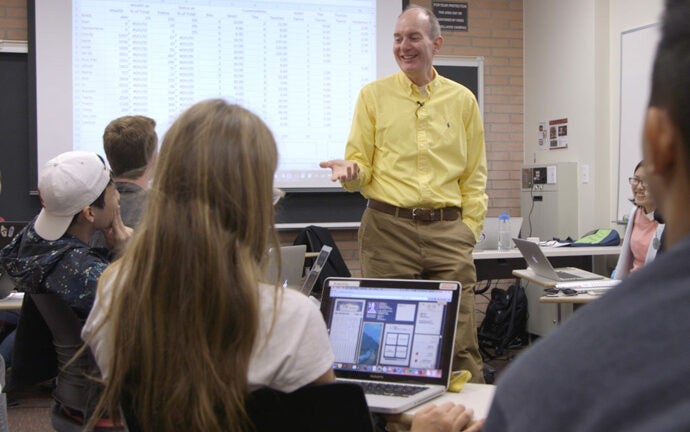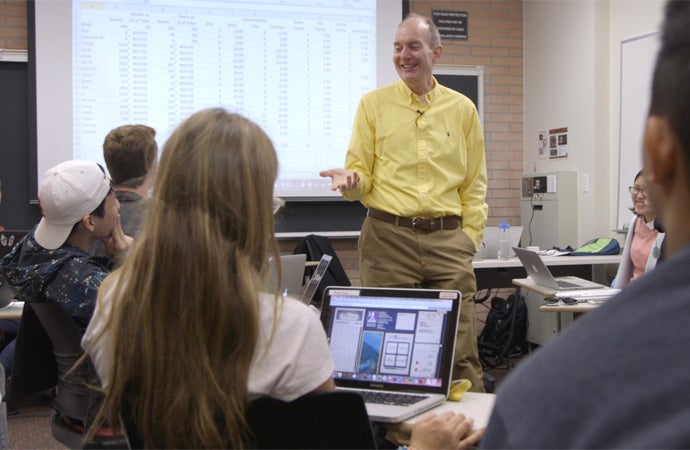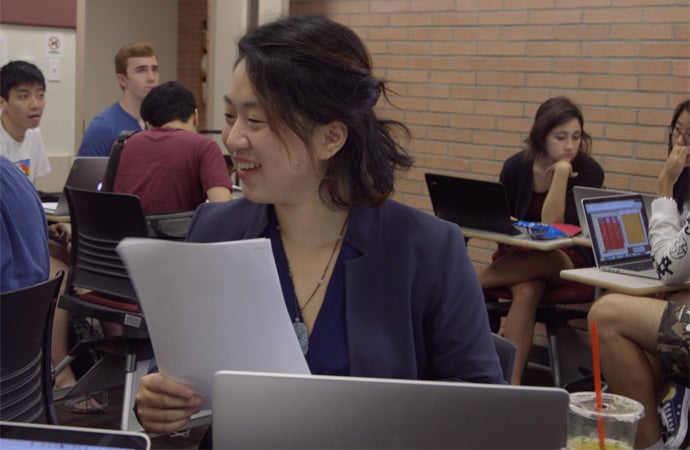
Gaming the past
Jenny Xu and her small family had worked hard to get ahead in life. With patience, focus and saved money, they managed to acquire several parcels of land and eventually even a permit to build a factory. Jenny began to flourish in her profession as a textile merchant and her family soon opened its own factory.
Then, the late Qing Dynasty ended, and with it, all the family’s good fortunes.
“I was really caught off-guard when everything was taken away from me during my 12th turn,” Xu said. “While I felt really frustrated about losing so much, it struck me that the same scenario happened to people from that era, only for them it was in real life and not a game.”
Xu is one of the first-year students experiencing the tumult of the last 200 years of Chinese economic history firsthand through a new seminar in the general education program called “Gaming Chinese Historical Capitalism.” Taught by Brett Sheehan, professor of history and director of the East Asian Studies Center, the course is groundbreaking in its use of a custom-designed online game that lets students put their classroom learning into practice.
“For a long time I had this idea of having a class that was run as a game,” Sheehan said. “I thought it would be a great opportunity to experiment with something new that would help students engage with the material. I thought an online game would be particularly appealing because students are so used to interfacing with computers.”
Time flies when you’re having fun
“China Times,” a role-playing game, spans four historical eras during which the rules of the political economy changed considerably. Players are all born peasants in the 1820s and are assigned to three-person “families” since, Sheehan noted, most Chinese pursued their mobility and economic strategies as part of a family unit. Then teams must decide: Are they going to invest in agricultural land or a cash crop like tea, cotton or silk? Maybe they will pursue business, or try to get an education and become a government official.

Brett Sheehan of history leads his “Gaming Chinese Historical Capitalism” class, which uses a custom designed online game to teach Chinese economic history. Photos by Mira Zimet.
“For each turn, students can only make one such action because in reality, we are limited,” Sheehan said. “I thought this would allow them to put themselves a little closer to the position of the historical figures they are reading about in class. These people were making decisions under uncertainty.”
Covering a 200-year timeframe, players transition their game characters through the late Qing Dynasty, the Republican period, the Communist era under Chairman Mao and the rising Chinese economy in the post-Mao period.
Sheehan conceived of “China Times” specifically for this class, selecting two student game design majors, Sean Wejebe of USC School of Cinematic Arts and Eric Nelson of USC Viterbi School of Engineering, to work closely with him to create the game in tandem with his teaching objectives. More than a year of development has gone into the project.
The class also includes readings, essays and class discussions.
“The papers that students write draw from the readings, many of which are the life stories and historical accounts of Chinese who have lived through these periods,” Sheehan said. “Students draw from these life stories to justify their strategies in the game. I find this makes the reading so much more alive for them.”
Sheehan, an expert on the economic and business history of modern China, said the class is a mix of students from a variety of backgrounds — including many Chinese students — that makes for lively and illuminating class discussions.
The game of life
Xu, an international relations major at USC Dornsife who grew up in China, was drawn to the gaming concept behind the class.
“Not only am I learning about modern Chinese history with a totally refreshing perspective, the game-play experience has really helped me to understand how people in China had to constantly make choices during these periods of turmoil,” she said.

First-year student Jenny Xu, an international relations major who enrolled in the new general education program seminar this Fall.
Economics and math double major Rowan McEvoy was also drawn to the class’s gaming component, and he’s considering a minor in East Asian studies.
“The most surprising part about the class is how interesting the readings have been,” he said. “Maybe it’s because we are required to engage with them and talk about them extensively in class, but the texts are really appealing.”
One of his favorite selections was one that focused on peasant survival strategies during the late Qing Dynasty.
“It was fascinating to see all the different ways that the lower classes endured the hardships of the times.”
Sheehan noticed that at first the families pretty much kept to themselves, but over time they realized the potential value of forming alliances.
“I actually had two families that decided to propose a marriage as a way of forming an alliance — one of the things they encountered in their readings.”
The rollercoaster effect
So why does modern Chinese history fit so well into the format of an online game?
“What makes the last 200 years of China so interesting is the radical regime changes they’ve had,” Sheehan explained. The country has experienced radical changes in the political economy, spanning everything from laissez-faire to agricultural economy, from strict socialism with virtually no private property to the new millionaires of the current Chinese economy.
“Because of that up and down rollercoaster I think the game is particularly suited to this history. We want to keep students interested in the game over the course of the semester, and players who are losing in one period might be winning in another, thanks to the changing political regimes. It gives them the ability to continue playing the game knowing that something big is going to shift later on.”
For Xu, the seminar offers an unusually vivid opportunity to understand the past.
“This class has really been an innovative way of learning history,” she said. “I have never been in any class as creative as this one. We are learning and at the same time having tons of fun!”